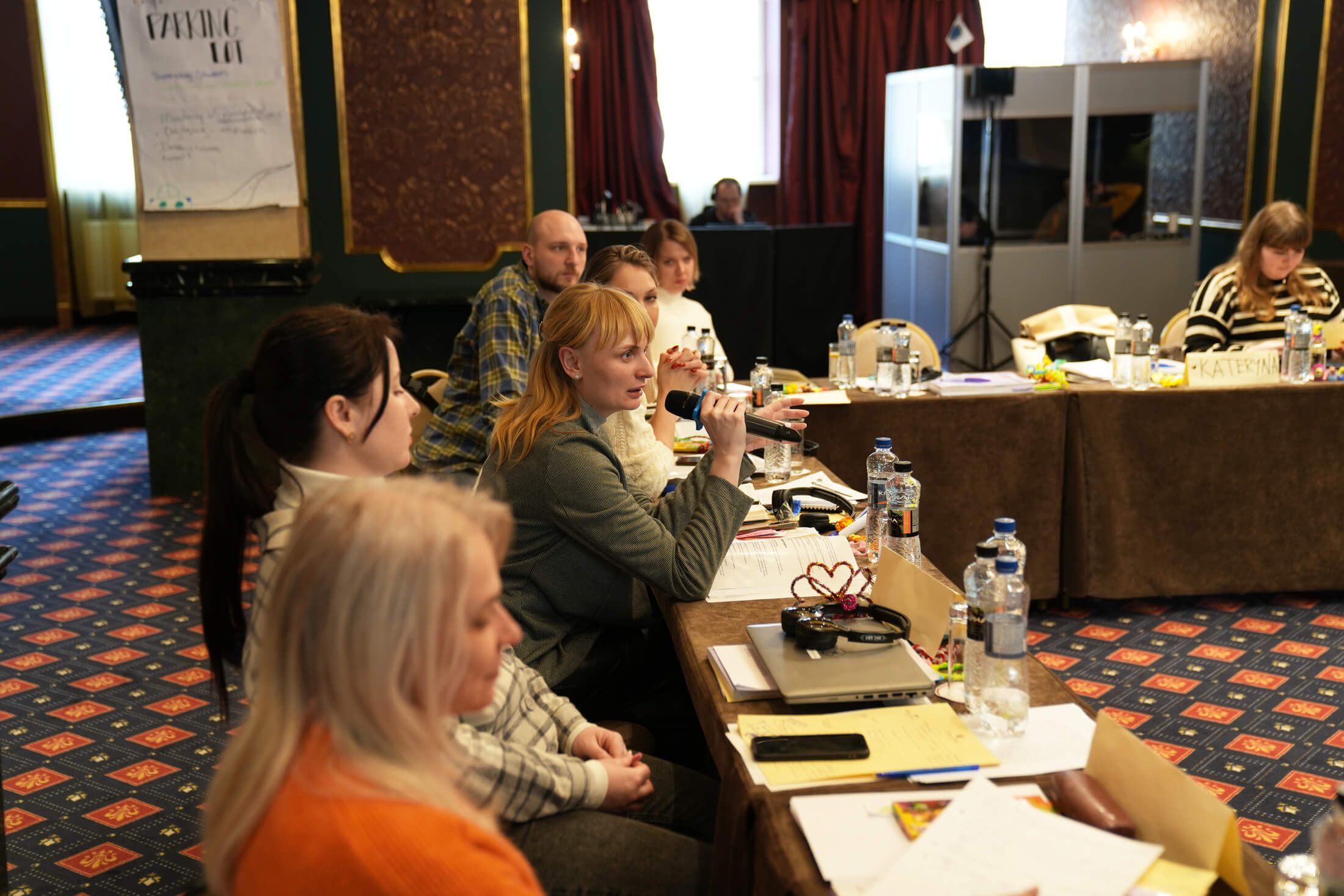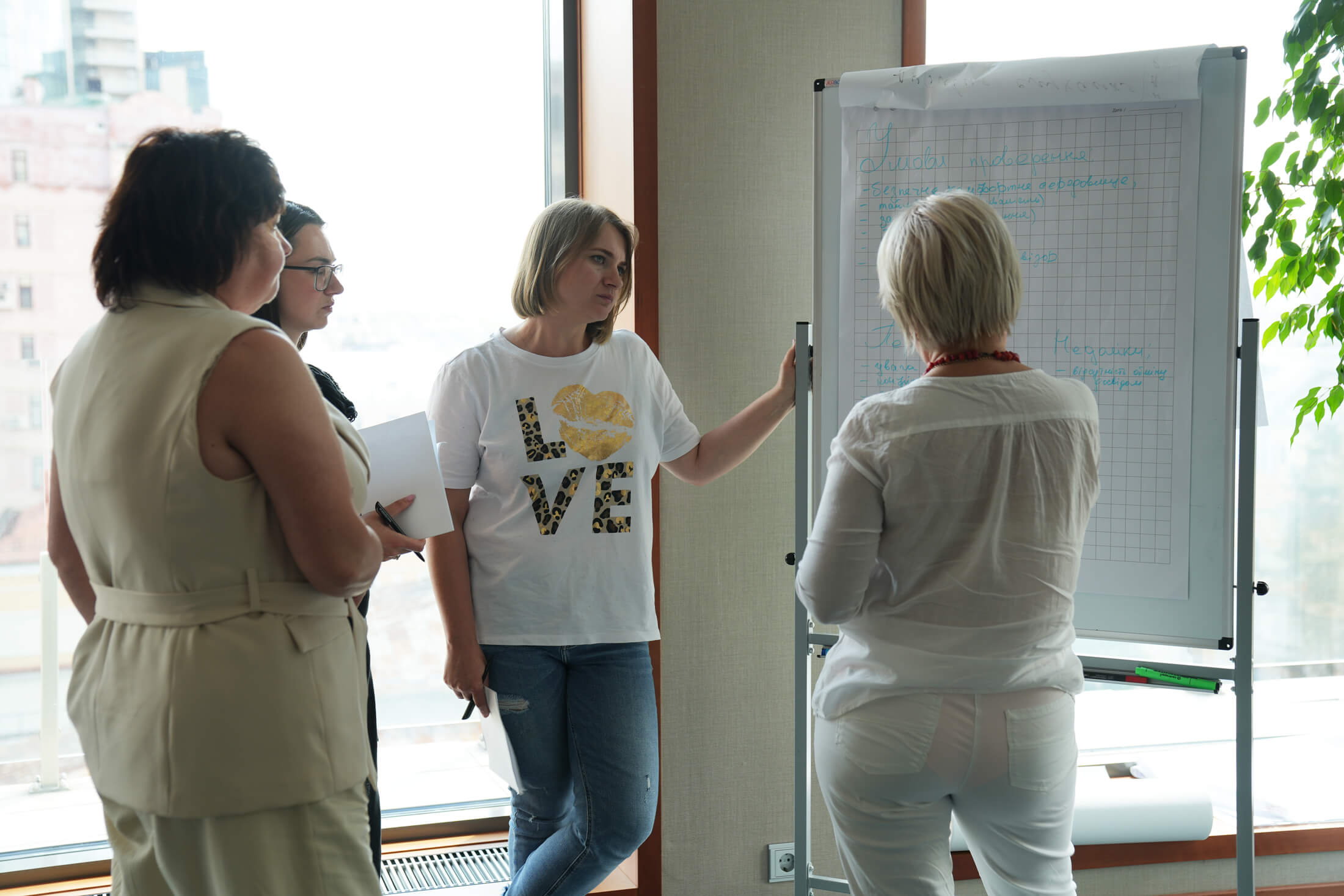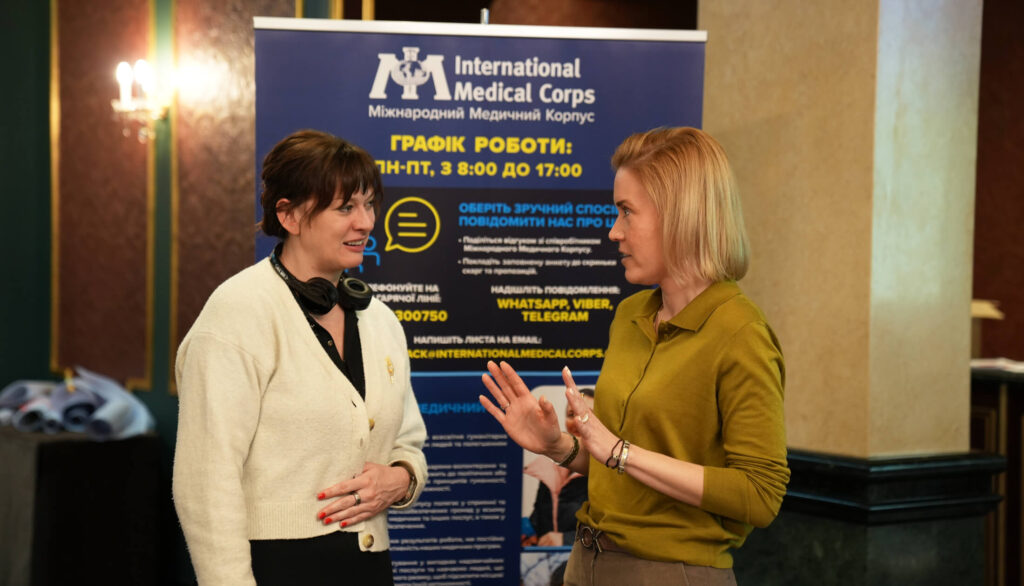Though mental health stigma has already begun to shift—a change driven by years of advocacy and growing public awareness—International Medical Corps is taking it even further by helping mental health and psychosocial support (MHPSS) providers improve delivery of this important service.
While MHPSS needs are rising among all Ukrainians, frontline workers are facing high levels of burnout after years of providing essential services in the face of ongoing conflict. The country—now in its fourth year since the full-scale invasion—is looking at solutions to meet these mounting challenges.
As part of our MHPSS programming, International Medical Corps is introducing the Integrated Model for Supervision (IMS), a structured, trauma-informed approach to helping care providers care for themselves that also is helping the Ukrainian MHPSS system transition from emergency response to sustainability.
Strengthening Supervision Structures with IMS
IMS is a framework that focuses on supportive care for mental health and other clinical professionals. Unlike traditional supervision models that focus on hierarchical structures or clinical oversight, IMS emphasizes three areas:
- emotional support to help practitioners process stress and secondary trauma;
- skills development for fostering long-term professional growth; and
- quality monitoring to ensure that patients receive ethical, effective and accountable services.
IMS shifts the focus of caregivers from coping alone to growing with others. Developed by the International Federation of Red Cross and Red Crescent Societies Reference Centre for Psychosocial Support, and Trinity College Dublin, IMS is uniquely suited to Ukraine’s context. It supports MHPSS professionals and opens doors across sectors—from humanitarian response and social services to healthcare and education.
“In a country where everyone is doing 10 jobs at once, IMS reminds people that they don’t have to do it alone,” says Roving Supervisor Kateryna Pokrovska.
The Ukrainian Rollout: A Systemic Approach
In 2024, International Medical Corps conducted three IMS training courses with the support of the Cabinet of Ministers of Ukraine’s Coordination Center for Mental Health, working within the framework of the nationwide mental health program “How Are You?”—an initiative of First Lady Olena Zelenska. These efforts brought together 44 people from medical universities, humanitarian organisations, public health systems, social services and national coordination bodies. The goal was to equip professionals working with war-affected Ukrainians with the skills to provide high-quality, emotionally attuned support, while caring for their own well-being as they continued to operate under ongoing crisis conditions.
In April 2025, International Medical Corps scaled up this approach by creating a pool of 14 national trainers—each representing a different sector and region—who will now be able to help roll out IMS across the country. The number of certified IMS trainers continues to grow, but what makes this rollout powerful is its scope: whether supporting medical interns in Kyiv, humanitarian responders in Odesa or educators in Kharkiv, the reach of IMS will rapidly expand, driven by Ukrainians who believe in what it can do.

“Ukraine is ready for models like IMS because we know how urgently sustainability is needed. When services threaten to collapse under pressure, supervision is what helps them hold,” says Ministry of Social Policy of Ukraine Liudmyla Perederei, who adds that 50 municipalities in Kyiv region are already asking for IMS guidance and protocols. “We’re not waiting for change from the top—we’ve already started from the ground up.”
From Learning to Leading: Sectoral Integration
International Medical Corps is supporting the national trainers as they begin implementing IMS and providing technical guidance, sector-specific planning and tailored support that adapts IMS to the healthcare, education and social protection systems.
A key part of this support is the IMS Community of Practice (CoP), which we launched to foster collaboration and knowledge exchange. The CoP brings together national trainers, trainees and stakeholders to coordinate efforts and tools, enabling a more unified approach to supervision.
In addition to the CoP’s ongoing efforts, IMS trainers have developed implementation strategies for their respective disciplines. Their planned activities include regional pilot projects, impact research in schools and health facilities, and interministerial advocacy for integration into policy and staffing frameworks.
International Medical Corps leads this process through bimonthly CoP meetings, peer-learning sessions and sector-relevant toolkits and supervision materials. We also help trainers document and share practical insights from the field—including case studies and recommendations for adaptation—to strengthen the quality and consistency of IMS in various contexts.
For example, Liudmyla sees IMS not just as a tool for psychologists but for anyone in people-facing roles—from social workers and civil servants to those working in local-government service centres. Her team is also using supervision for service monitors, which will reinforce trust and accountability across public systems.
In healthcare, Liubov Chygrynska—an MHPSS expert at the Coordination Center for Mental Health—believes that IMS is critical to supporting doctors, nurses and social workers who often work in challenging environments. Her team develops adapted supervision formats for healthcare facilities, taking into consideration the challenges of overload and understaffing, and the high risk of burnout.
“IMS helps healthcare workers feel like they’re part of the system and also part of a community where their needs are not ignored,” Liubov says.
“We talk about burnout like it’s inevitable. But IMS helps us create systems where support isn’t the exception—it’s part of the job,” says Kateryna. “Our staff members feel safer, more focused and more supported. It gives us structure without pressure, which is something every humanitarian team needs.”
According to Kelly McBride—one of the key developers and lead facilitators of IMS—Ukraine’s step-by-step commitment has created a momentum that’s rare even in global IMS programmes. The model is no longer something “delivered” to Ukraine; it’s now being adapted by Ukrainians, for Ukrainians.
“What’s happening in Ukraine is implementation and innovation. Practitioners are taking the model and shaping it around their realities—which is exactly how supervision becomes sustainable,” Kelly says.

The Future of IMS
For humanitarian organisations, supportive supervision is often the link between staff well-being and program effectiveness. At International Medical Corps, IMS is already integrated internally, with plans underway for regional rollout and partner engagement.
While national efforts to strengthen supportive supervision are underway in Ukraine, International Medical Corps conducted three more IMS training sessions in June for people in the education, social service and healthcare sectors, with the support of the Coordination Center for Mental Health and within the “How Are You?” framework. These sessions will further strengthen the capacities of national trainers and initiate the model’s implementation across the public sector.
In a time when human resilience is tested daily, Ukraine is transforming. The adoption and rollout of IMS signals a cultural evolution—from coping to collective care, from burnout to balance, and from isolation to interconnection.
